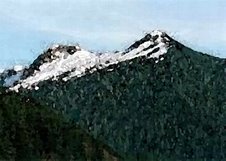According to this morning's news, there might possibly still be some sort of presidential debate tomorrow between Barack Obama and John McCain, and it's a good time to think about what sort of education and awareness you feel is necessary to be a good president. Foreign policy, economics, national security, physics....
Physics? Absolutely, according to Richard A. Muller, a physics professor at UC-Berkeley and the author of our new book Physics for Future Presidents: the science behind the headlines. Muller tackles some of the most pressing issues in American life and politics, debunks some common myths and explains the science in a way that is easy to comprehend. Under the major headings of Terrorism, Energy, Nukes, Space, and Global Warming, he discusses things such as suitcase bombs, biofuels, nuclear waste, electric cars and spy satellites. In one chapter of particular local interest, he discusses the effect of global climate change on the Alaskan permafrost layer. Buckling roads, sinking houses and beetle infestations are concrete problems that Alaskans are dealing with right now. Even more intriguing, he suggests possible solutions based on probable cause.
The book is actually based on a course that he teaches at Berkeley for non-science majors, so the topics and explanations have been 'road tested' on hundreds of undergrads. Physics for Future Presidents not only explains the issues that we need to know as informed Americans, but it also highlights the importance of science in everyday life (something to think about if you have a reluctant science student at home - have them read this book and maybe they'll be a little more enthusiastic about their class).
Thursday, September 25, 2008
Subscribe to:
Post Comments (Atom)

1 comment:
I *LOVE* Physics for Future Presidents and heartily recommend the book and the companion video lectures which are available from UC Berkeley at http://webcast.berkeley.edu/course_details.php?seriesid=1906978373 and on YouTube if you search for "Physics for Future Presidents."
I liked the book so much that I put it on a personal Open WorldCat list I created called the Presidential Reading/Viewing List. I'm hoping that others will create their own lists with the distant hope of the next President picking a few items for a few lists. Or the more likely hope that people will pick up good books to be better informed.
That's my dream, anyway.
Post a Comment